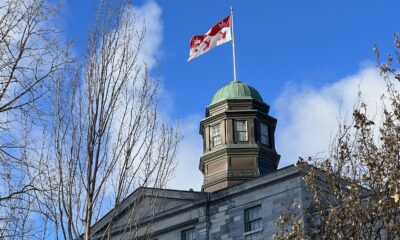Politics
Canada Questions Counter-Tariffs Amid Economic Concerns

Canada is reassessing its approach to counter-tariffs in light of the economic implications of U.S. tariffs imposed by President Donald Trump. A shift in sentiment has emerged among Canadian leaders, recognizing that responding to these tariffs with a dollar-for-dollar equivalent may not be the most effective strategy for the nation’s economy.
Shift in Leadership Perspectives
Initially, voices opposing counter-tariffs faced significant backlash. Notably, Alberta Premier Danielle Smith was criticized when she questioned the effectiveness of broad-based counter-tariffs. Recently, this perspective has gained traction, with Saskatchewan Premier Scott Moe and British Columbia Premier David Eby joining Smith in advocating for a more selective approach.
Previously, Prime Minister Mark Carney supported the idea of comprehensive counter-tariffs during his campaign for the Liberal leadership. However, the current federal policy reflects a more nuanced position, opting for selective counter-tariffs and temporary exemptions for Canadian industries that rely heavily on U.S. imports. This adjustment aims to mitigate the economic burden on Canadian consumers.
Economic Impact of Tariffs
The economic implications of responding with counter-tariffs have raised concerns for Canadian households. A recent study by the Montreal Economic Institute revealed that current counter-tariffs have resulted in an additional burden of $1.51 billion in taxes for Canadians, averaging $91.50 per household during April and May 2023. If this trend continues, the total cost could escalate to $9.1 billion, or approximately $548.97 for every household, by the end of the fiscal year on March 31, 2026.
“Tariffs, whether they are applied unilaterally or in retaliation, are taxes by another name and they squeeze families just the same,” stated economist Emmanuelle B. Faubert from the Montreal Economic Institute.
During the election, the Liberal government projected that Canadian counter-tariffs would generate $20 billion in revenue, which they intended to allocate toward supporting industries and workers affected by U.S. tariffs. This projection now seems increasingly optimistic in light of the escalating costs associated with counter-tariffs.
The idea of engaging in a dollar-for-dollar tariff battle with the United States, an economy ten times larger than Canada’s, appears increasingly impractical. While only Canada and China have enacted counter-tariffs in response to Trump’s policies, it is evident that such measures tend to inflate costs for consumers in both nations.
While selective counter-tariffs might serve a purpose in protecting certain industries, the overarching strategy of a broad-based tariff war is fraught with risks. Canada’s leadership now seems to recognize that engaging in a retaliatory tariff conflict could ultimately prove detrimental, exacerbating economic challenges for Canadian families and businesses.
As discussions continue among provincial leaders and federal authorities, it remains crucial for Canada to find a balanced approach that protects its economic interests without imposing undue burdens on its citizens.
-

 Politics4 weeks ago
Politics4 weeks agoSecwepemc First Nation Seeks Aboriginal Title Over Kamloops Area
-

 World5 months ago
World5 months agoScientists Unearth Ancient Antarctic Ice to Unlock Climate Secrets
-

 Entertainment5 months ago
Entertainment5 months agoTrump and McCormick to Announce $70 Billion Energy Investments
-

 Science5 months ago
Science5 months agoFour Astronauts Return to Earth After International Space Station Mission
-

 Lifestyle5 months ago
Lifestyle5 months agoTransLink Launches Food Truck Program to Boost Revenue in Vancouver
-

 Technology3 months ago
Technology3 months agoApple Notes Enhances Functionality with Markdown Support in macOS 26
-

 Lifestyle3 months ago
Lifestyle3 months agoManitoba’s Burger Champion Shines Again Amid Dining Innovations
-

 Top Stories2 months ago
Top Stories2 months agoUrgent Update: Fatal Crash on Highway 99 Claims Life of Pitt Meadows Man
-

 Politics4 months ago
Politics4 months agoUkrainian Tennis Star Elina Svitolina Faces Death Threats Online
-

 Sports5 months ago
Sports5 months agoSearch Underway for Missing Hunter Amid Hokkaido Bear Emergency
-

 Politics5 months ago
Politics5 months agoCarney Engages First Nations Leaders at Development Law Summit
-

 Technology5 months ago
Technology5 months agoFrosthaven Launches Early Access on July 31, 2025




















